The Near Grazing of Glacier
Horace Albright sat gloomily in front of the fire. It was tough to be gloomy in this situation: He was in the Glacier Park Hotel (now called the Glacier Park Lodge) in the summer of 1917, admiring the “indoor campfire” in the stone fireplace amid the epic timbers of the lobby of that grand hostelry, then just four years old. His train would arrive shortly.

Albright should have been able to take particular pride in his surroundings, because he was acting director of the National Park Service, a stunning position for someone then just 28 years old. Tall and bespectacled, he was known as modest, patient, and tactful, full of integrity and idealism—but relentless. A Scribner’s magazine profile later noted, “he never fails to get what he wants.”
Albright kept toying with leaving government service to start a business career, but in the year-plus since he and his mentor, Stephen Mather, had founded the National Park Service, they’d had too much to do. Although individual national parks had been around for a while, Mather and Albright were truly nationalizing them, centering a system on the goal of helping Americans appreciate incredible landscapes.
And here he was square in the middle of one of America’s greatest landscapes, with jagged spires nestling snowy glaciers that spilled down into valleys blanketed in wildflowers. Yet he was gloomy because he’d just come out of a meeting where he had failed to ward off what he saw as a huge threat to Glacier — indeed, to the still-fragile idea of what a national park should be. And now, overhearing two authoritative Westerners praise the park’s wildflowers, he urged them to go back for a last look. The sights wouldn’t be the same next year.

Just a few months previously, the nation had joined the monumental World War, and patriotism burned. Albright’s boss, Interior Secretary Franklin K. Lane, sought to put his whole department on a war footing. One of the most pressing issues, Lane and others believed, was the food supply. President Woodrow Wilson had demonstrated the need to increase food production by letting sheep graze on the White House lawn. Could Interior Department resources also help?
Enter the Penwell Sheep Company. Lewis Penwell, an attorney in Helena, Montana, was also an investor in real estate, newspapers, and sheep. At one time Penwell owned one of the largest sheep herds in the world, which he managed under an unusual economic model: he would place his sheep with small ranchers in exchange for a portion of the profits. Penwell saw himself as overcoming limitations in capital markets that prevented such small ranchers from amassing the capital to buy their own herds; meanwhile, Penwell got to run larger herds than the land he owned could otherwise support.

A political operator, Penwell was also a close friend of Senator Thomas J. Walsh (D-Mont.). Walsh and Albright were bitter enemies. “I thoroughly detested Walsh,” Albright later wrote, citing him as “ruthless, inconsiderate… [and] belligerent toward our conservation goals.” Furthermore, Albright believed that criticism from Walsh had helped send Mather (who today would likely be diagnosed as bipolar) to a sanitarium, resulting in Albright’s “acting” directorship.
With Walsh’s vocal aid, Penwell proposed to the Interior Department that he could help the war effort by grazing his sheep in Glacier. Lane agreed. But Albright hated the idea. He had helped write the law establishing the Park Service, with its eloquent language about keeping parks “unimpaired for the enjoyment of future generations.” Elsewhere, overgrazing had decimated grasslands, failing to preserve the wildflowers for future generations.
So what did patriotism mean? To Albright, it meant protecting what was special about America, including its natural wonders such as the pristine quality of these valleys. Given these priorities, Albright had unsuccessfully argued, parks should not be used for wartime food production unless the war took an improbably disastrous turn.

Albright fought these battles across the nation. In Yosemite, he raised an uproar over a proposal to feed 50,000 sheep in the park, in part by referring to the sheep using John Muir’s phrase “hooved locusts.” At Mount Rainier, he probably coordinated with the Washington Mountaineers Club, which offered to give over their Puget Sound lawns and golf courses to keep sheep out of the park. And he had come to Glacier to make the personal appeal to the leaders of Penwell’s firm. But “I had found those fellows arrogant and adamant,” he wrote in a memoir.
Then, brooding at the hotel in East Glacier, he overheard the conversation about wildflowers. “It won’t look like this after the sheep are allowed to eat it all up for a sack of silver,” Albright told the men.
Intrigued, they encouraged him to explain. One of them, it turned out, was Walter G. Hansen, owner of a meat-packing facility in Butte, Montana. This was not just a local slaughterhouse: it was a four-story, $500,000 plant that by 1929 would employ 350 people—and it likely focused on hogs and cattle rather than sheep.

Furthermore, Hansen and Albright both shared the view, common in that day, that cattle were gentler grazers than sheep. So Hansen proposed that instead of leasing the entire park to Penwell for sheep, Albright lease a slice of it to Hansen for cows. It would be a small herd of cows on some isolated chunk of land, Hansen proposed. But it would satisfy Lane’s desire to use the park for food production Penwell and any other applicants could be justifiably denied.
Albright loved the idea. But could he pull it off? The most immediate problem was Hansen’s companion: J. Bruce Kremer, a Butte attorney and politico who was associated with the Montana Council of Defense. Organized to aid the war effort at home, the Council’s initial priorities involved raising Montana food production by at least 30 percent. Kremer was also vice-chairman of the Democratic National Committee and a strong ally of Senator Walsh. Albright feared that Kremer would leak the news to Albright’s enemy Walsh. Walsh might alert Penwell or Lane to the subterfuge.

But Albright may not have realized a couple of other things about Kremer. One was that the Council of Defense’s agricultural goals were proving difficult to achieve in the face of region-wide drought. Indeed the Council would soon start battling a radical Butte labor union, as well as favoring Inquisition-like tactics to suppress dissent—moves that have since made it notorious, but may have been at least partly motivated by the impossibility of achieving its original agricultural goals. Another was that Kremer’s brother Alfred, also a Butte attorney, was a business partner of Hansen’s. Bruce’s personal relationships could outweigh his political loyalties.
Bruce pledged to Albright that he would pretend he “couldn’t remember a thing” about this conversation. But could Albright trust him? Butte has long been known throughout Montana for hard-nosed dealings in business and politics. If Albright’s scheme were exposed, it could be not just embarrassing, but politically dangerous, given Walsh’s power. Or perhaps Hansen, having beaten Penwell to the contract, would exploit it as fully as Penwell would have.

Albright gambled. In the memoir, he recalled how it paid off: “Late in the summer of 1918, Hansen unloaded a carload or so of cattle in the southern end of the park. After the war ended a few months later, every head of Hansen’s cattle was removed, leaving Glacier unharmed.”
Records that have survived in the Glacier archives suggest a slightly different story. The 1918 concession contract with the Glacier Park Hotel Company included — for the first and last time — a clause regarding livestock grazing “to supply and accommodate its guests and employees in the park.” If we accept this version of the story, Hansen wasn’t involved in the solution, but Albright’s insight from that conversation — to make an end run around Penwell with a less damaging alternative—was instead applied with a familiar party.
This version also highlights Albright’s concern: not grazing so much as grazing for external, commercial purposes. To many ecologists today, the issue is that grazing animals — including the horses that Albright loved to use for pack trips in Glacier and elsewhere — alter the ecosystem. (Meanwhile, some national park ecosystems are so altered by past grazing that they are best maintained by continued grazing. This scientific judgment, along with political factors such as how a park was acquired or commissioned, means that although Glacier remains off-limits to grazing, other parks have other policies.)

But to Albright the issue was not ecology so much as commerce. And his ideal proved lasting: Today, many people see national parks as set aside from common economic purposes such as raising stock for food or damming rivers for electricity—because they have assimilated Albright’s views. Albright and Mather were trying to establish parks as sacred sites, set aside from any day-to-day concerns. Although this view may be overly simplistic (because parks can’t be — never have been — utterly segregated from the effects of their surroundings, whether historical indigenous cultures or future climate change), it has fostered a worthy and meaningful conservation movement for over a century.
And had Walter Hansen not admired the wildflowers in Glacier — and then voiced that admiration to a desperate man in the Glacier Park Hotel — those ideals might well have been stymied by the perceived hunger of a nation at war.
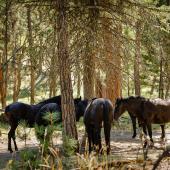
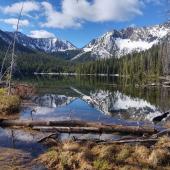
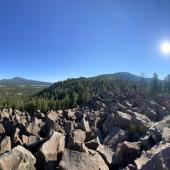
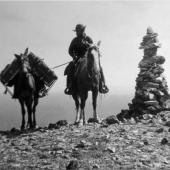
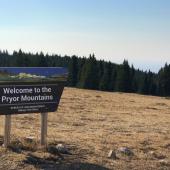
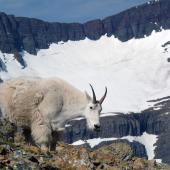






for THE NEAR GRAZING OF CLACIER, BY JOHN CLAYTON, DISTINCTLY GLACIER, MAY 2021. Thank you for publishing this highly informative article regarding the near catastrophic grazing plan for Glacier National Park, for food production during the Great War in Europe. Thank God for great thinkers like Horace Albright in 1917, in having foreseen the great environmental damage that sheep grazing could and would do to western lands, including our country's great National Parks. I was astounded to learn about such environmental damage firsthand over a lifetime of hunting and hiking in the Northern Rockies. There's a place in the world for sheep grazing, but only where grass and rain are far more plentiful than the American West -- such as in Ireland and much of Great Britain. where the sheep can be managed and rotated among small fenced fields for a few days at a time. Clearly, Horace Albright understood that about such grazing far better than most of us Americans will ever understand. Thanks for educating us further on this important matter.
Semper Fi, Do or Die
Jim Cleary (age 74)
Blaine Minnesota. 55449
Thank you all at Distinctly Montana, for all you do for our nation. You should feel good about your roles there.
- Reply
Permalink